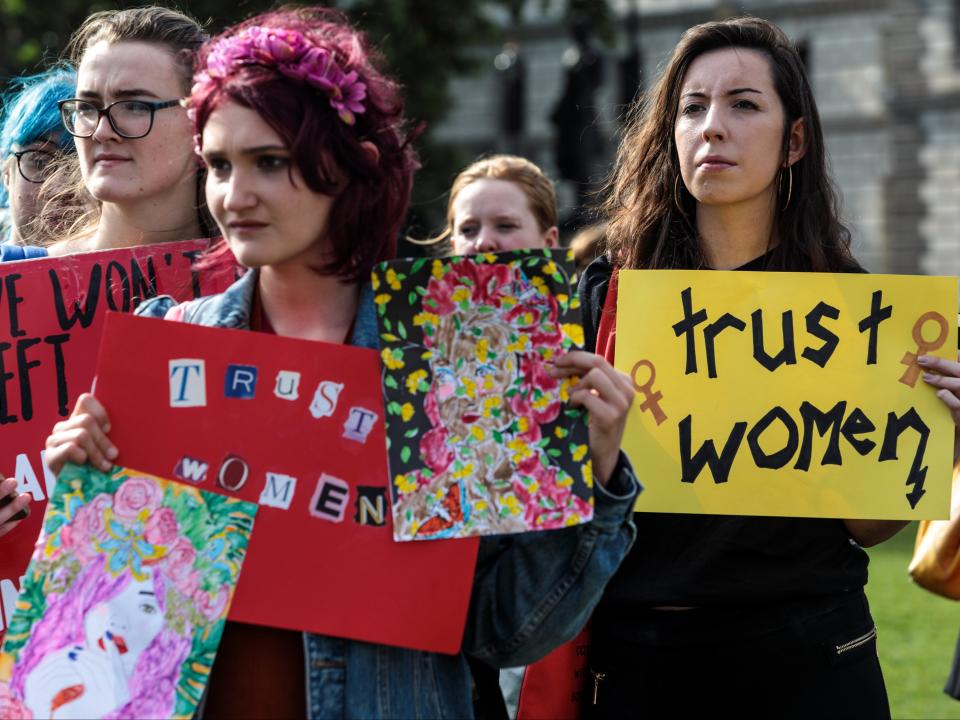Government delays over whether to continue at home early abortions ‘making women confused and fearful’

Government delays over whether to continue allowing at home early abortions are leaving women confused and fearful, campaigners have warned.
Leading healthcare providers have repeatedly called for the option to have at home early abortions, which were rolled out in the wake of lockdown measures in spring 2020, to be made permanent.
The UK’s largest study into abortions previously found at home early medical abortions pose no greater risk and allow women to have the procedure much earlier on in their pregnancy.
Having a medical abortion involves taking two tablets – with health professionals saying the pills have less adverse consequences than paracetamol. Prior to the pandemic, getting the first tablet, mifepristone, necessitated a visit to an abortion clinic.
Mandu Reid, leader of the Women’s Equality Party, accused the government of dragging its feet over whether to extend the measures or roll them back and accused ministers of generating a climate of “uncertainty” for women seeking an abortion.
She told The Independent: “We need the see the government prepared to stick up for women. This uncertainty reinforces the idea that the government aren’t there for us.
“If you are dealing with an unwanted pregnancy, it creates unnecessary stress. For some women, they may not terminate the pregnancy because they are unclear of what the rules are as a worst case scenario.”
The government consultation about whether to roll out at home medical abortions permanently finished at the end of February – with campaigners expecting ministers to decide on whether to extend the measures towards the end of May.
Ms Reid’s party are staging a protest outside the Department of Health on Tuesday afternoon urging Matt Hancock not to reverse the measures.
She added: “It is one of the few things about the pandemic that has actually resulted in an improvement for women. It gives more women control over their bodies. There is no reason whatsoever to roll back.
“If we roll back on this, 30,000 women will be forced back into waiting rooms overburdening an overstretched NHS struggling with backlogs because of the Covid crisis. Matt Hancock has an opportunity here to do the right thing for women.”
The NHS is planning on the basis of women being able to continue having abortions at home, Ms Reid said. She explained she had heard reports from healthcare providers that the government’s consultation was inundated by anti-abortion activists – adding that it would be “extremely demoralising” if the government “dithers” as a result or is “swayed” by them.
A report released in February, conducted by the British Pregnancy Advisory Service and MSI Reproductive Choices, found there were no cases of significant infection which necessitated the woman to go to hospital or have major surgery.
Researchers, who examined more than 50,000 early medical abortions between January and June last year, drew attention to the fact that despite misinformation to the contrary, not one individual died from having an at home early abortion.
Eight in 10 women said at home abortions were their preferred choice and they would opt for it in the future, while waiting times from when the woman has her consultation to treatment improved from 11 days to 7 days.
Researchers found the outcomes for in-person abortions and taking the pills remotely were almost precisely identical. While the introduction of at home abortions had substantially cut the duration of the pregnancy at the time of the termination.
Louise McCudden, of MSI Reproductive Choices, told The Independent: “It is safer for some clients in vulnerable situations. For example if you have an abusive partner.
“We hear from some clients is it is much safer to have pills sent to their home rather than leaving home for a significant amount of time. Also, some people may be dependant on a parent for transport.
“We struggle to see any clinical or ethical reason not to keep it as an option. The sooner the better that the government can give clarity.”
She noted the new measures also allow people to have more control over their abortion and the process is now more “dignified”, adding that women can take the pill at home with their partner listening to music for example.
“Another aspect is you don’t have to walk through crowds of anti-abortion protesters who routinely harass women,” Ms McCudden added.
A spokesperson for the Department of Health said: “Safe and continued access to key services has been, and remains, our priority.
“The current temporary measures allow eligible women to take both pills for early medical abortion up to 10 weeks’ gestation at home, following a telephone or e-consultation with a clinician.
“The government’s consultation on whether to make the current measure permanent has now closed and we are carefully considering all of the responses received, and plan to publish our response later this year.”
Read More
The pandemic revolutionised abortion access. Why should we say goodbye to pills by post?

 Yahoo Finance
Yahoo Finance 